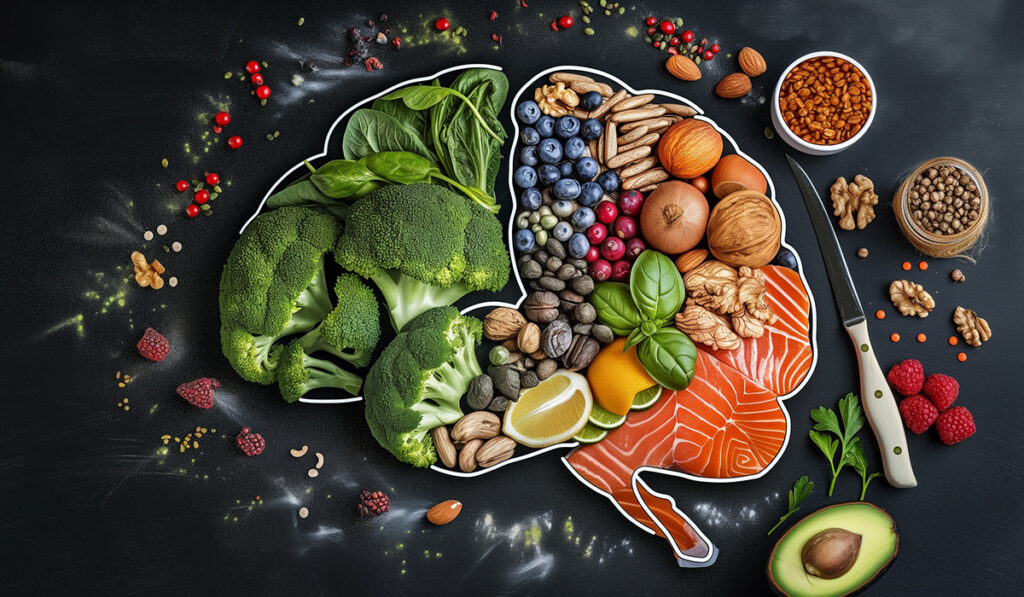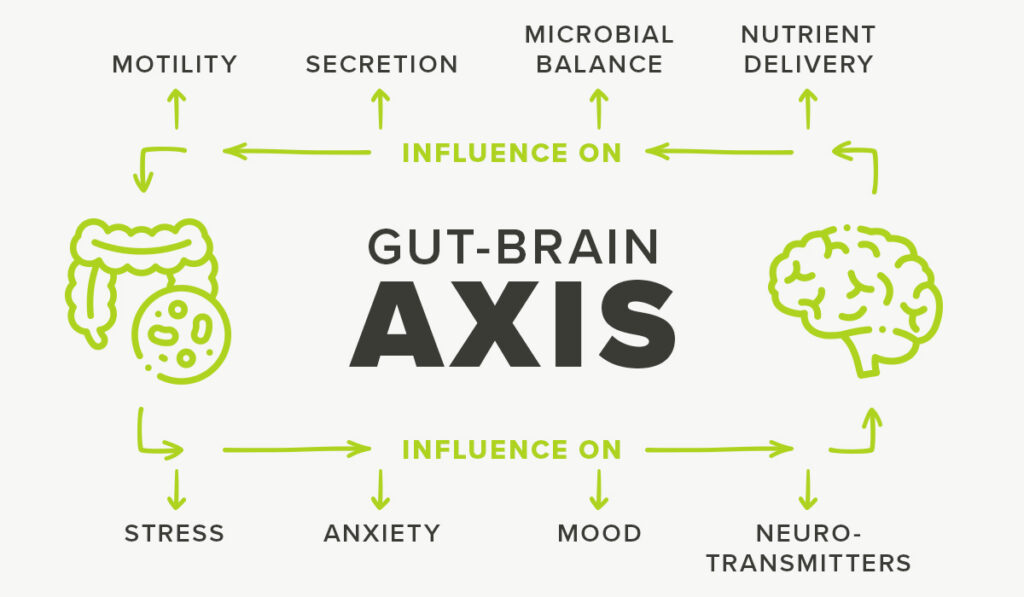ARTICLE AT A GLANCE
Memory, focus, concentration — they’re all affected by what you eat. Your brain needs a diet rich in energy-boosting foods and healthy fats for optimal function and to help prevent cognitive decline later in life.
Since many people don’t realize just how closely linked diet and brain health are, this blog will explore:
Food fuels your body, and much like an automobile, your body runs more efficiently on higher-quality fuel. As the engine that powers it, that’s especially true for your brain, which requires plenty of minerals, vitamins, and antioxidants to nourish and protect it.
Along with the nutritional quality of your diet, your gut health and immune system are also key factors in your brain and cognitive health. However, what you eat, how much of it you eat, how much you exercise, and how well you sleep are all proven to impact gut and immune health, making the quality of your diet an incredibly impactful influence.

The Diet-Gut-Brain Connection
Your brain accounts for only about 2% of your body’s weight, but it uses up to 20% of its energy. Nearly 60% of your brain is essential fatty acids, which it needs to produce acetylcholine, a neurotransmitter that’s essential for learning as well as for forming and recalling memories. To function properly, your brain needs a diet rich in both energy-boosting foods and healthy fats.
There are many other avenues through which your diet, your gut, and your brain health are all connected. For example, inflammation is at the root of most chronic neurological conditions, and it can be largely reduced by eating a nutrient-rich diet that balances out your gut microbiome and your immune system’s control over inflammation.

How well your brain functions is also intricately tied to your gut health, where most of your immune system resides. Your overall health and wellbeing rely on a proper balance of healthy bacteria and microbes in your gut. That balance can be disturbed by several mental and neurological factors, including chronic stress, anger, anxiety, and depression.
You might not be aware of just how intricate this connection is or how the food you eat has detrimental effects on your brain health. For example, the refined sugar found in most processed foods lacks vitamins, minerals, and fiber. Biologically, your body needs these and other macronutrients such as lipids, proteins, and carbs.
If the food you eat is inadequate and lacks the nutritional integrity of real food, then your brain and body won’t receive the energy they need to function properly. If the fuel you consume is too low-quality, it will do more harm than good.

The Perils of Poor Food Quality
Most people’s obliviousness to their food quality and its effect on their brain health is due to several factors. Confusion is a significant one. According to a recent survey of consumers in the United States, 95% of respondents sometimes or always search for healthful foods when shopping, but only 28% of respondents said doing so was easy. This is mainly due to confusing labels and mountains of misinformation.

Among people who can and do eat healthy foods regularly, other factors such as health conditions and medications can still impact their ability to absorb nutrients. Some drugs bind with nutrients so your body can’t absorb them, while others can destroy the healthy bacteria in your gut microbiome that play roles in digestion and absorption.
These and many other factors contribute to the formation of metabolic diseases such as diabetes. The presence of metabolic disease makes you more likely to experience declining cognition and brain health, as research published by the American Diabetes Association suggests insulin resistance could be related to the development of Alzheimer’s disease.
In fact, people who have Type 2 diabetes might be as much as 60% likelier to develop Alzheimer’s or other forms of dementia, according to the research. Alzheimer’s is even referred to colloquially as “Type 3 diabetes” when it’s triggered by insulin resistance.
Having Type 2 diabetes increases the risks of brain health concerns later in life. Fortunately, there are ways to mitigate those risks. Since nutrition is the tie that binds your body and brain health together, it’s also the best place to start improving both.

Southwest-Style Salmon Croquettes with Black Beans
The omega-3 fatty acids found in dishes like this are incredibly important for overall cognitive health.
390 CALORIES • 33G PROTEIN • 41G CARBS • 10G FAT
How to Improve Your Brain’s Fuel and Function
You can largely mitigate your risks or symptoms of Type 2 diabetes by improving certain aspects of your diet and lifestyle. In much the same way, you can control your risks of cognitive decline and Alzheimer’s disease (or Type 3 diabetes) making better nutrition and life choices. Start with these steps toward a healthier gut and brain:
1. Track glucose (even if you aren’t diabetic).

Glucose is your brain’s primary source of energy for basic functions as well as higher-order functions such as decision making, focusing, and calculating. However, too much glucose leads to insulin resistance, which causes mental fatigue and Type 2 diabetes. Use a glucose monitor to track your levels regularly, ensuring they don’t begin to drop or spike.
Eating foods that have a low(er) glycemic load and are low allergenic can help stabilize insulin. Examples include jasmine rice, sweet potato, white potato, fruit, and cooked vegetables.
2. Feed your gut microbiome.

The connection between your gut and your brain is so well known that your gut is often referred to as your second brain. Besides carrying most of your immune system, which controls inflammation in your brain, your gut also produces most of your body’s serotonin. This hormone plays a significant role in everything from your mood and sex drive to your stress levels and quality of sleep.
Eat more probiotics, healthy protein, and omega-3 fatty acids to boost and balance out the good bacteria in your gut.
3. Learn how to sleep better.

The quality of your sleep is vital to nearly every aspect of your health, and it can directly affect your brain health and cognitive function. When you sleep, the space between your brain cells expands, allowing it to clear out toxins that build up during the day. Astonishingly, much of this gunk consists of beta-amyloid protein, a precursor to the plaque found in the brains of Alzheimer’s patients.
Develop a routine that helps you sleep well consistently so you give your brain the time it needs to recover from the day.
4. Burn the fuel you consume.

Fuel is only useful when you burn it, and physical exercise is a proven way to improve body and brain function, plus fight stress, anxiety, and depression. It also improves brain neurogenesis, or the development of new neurons in your brain.
When you exercise regularly, the synapses in your brain fire faster, improving your learning, memory, and ability to focus and process information. Your workouts will also draw oxygen from your brain, forcing it to ramp up its production of antioxidants.
5. Stick to a de-stress routine.

Even if you aren’t resistant to insulin, excessive stress can lead to mental fatigue, fogginess, and declining cognitive function. It can also make you more insulin resistant, exacerbating the symptoms and your overall health risks. When you’re chronically stressed, your brain and body cells accumulate free-radical damage, increasing your risks of cancer, cardiovascular disease, diabetes, and Alzheimer’s disease.
Find ways to regularly de-stress that work for you.
6. Play brain games to stay sharp.

Exercising your body and finding ways to de-stress will help lessen the effects of oxidative and free-radical damage to your brain cells.
You can also actively strengthen your brain by “working it out,” too, with challenging brain games.
Research has proven that playing a brain-stimulating game can boost your brain’s activity and, over time, enhance memory, processing speed, and concentration. Some games can even provide emotional satisfaction and a gratifying sense of accomplishment.
A Few Nutrition Tips to Remember
In addition to the above tips, you can directly improve the quality of the fuel you give your brain and body by actively improving the quality of food you consume. For instance, eating foods high in glutathione, a vital antioxidant, can help you boost your ability to fight oxidative stress and damage to your brain cells.
Most proteins, such as pork, beef, chicken, and other poultry, can increase your glutathione levels. Monounsaturated fats, found in foods such as avocados, can promote healthier blood flow to the brain, while salmon, mackerel, tuna, and other fish rich in omega-3 fatty acids can optimize the function of your neurons.

Porcini Top Sirloin Steak and Roasted Root Vegetables with Tomato Bacon Jam
This is a clean, nutritious meal with a generous serving of brain-boosting protein.
420 CALORIES • 36G PROTEIN • 22G CARBS • 20G FAT
Find the nutrition you need on this week’s menu.
SHOP NOW >






